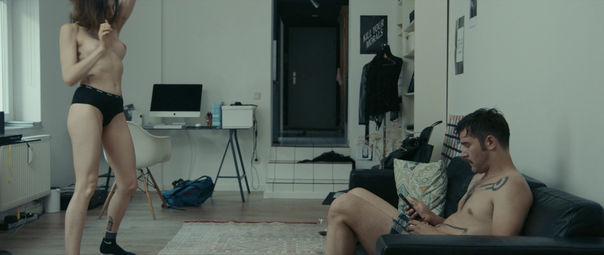Sex and the City: Tamer Jandali’s EASY LOVE
by Wilfred Okiche

© Janis Mazuch
Opening the Perspektive Deutsches Kino section of this year’s Berlinale, Tamer Jandali’s feature length debut, EASY LOVE, is a hybrid documentary-fiction experimental foray that blurs the lines between fiction and reality. From the get-go, Jandali declares his agenda, prefacing EASY LOVE with the mantra “No Actors, No Scripts, No Fake Emotions”.
Jandali follows seven mostly heterosexual adult individuals navigating the limits of sexual behaviour as they constantly negotiate ideas of romantic relationships. There are no rules to the game and within the context of their individual lives, the characters meet cute, fall in love, break up with, hurt and brutalise each other.
A couple seeks to convince themselves (and the audience) of the merits of opening up their relationship to accommodate other sexual partners, a homeless man resorts to trading his body for a bed to spend the night, a young lady takes up transactional sex and clashes with her more conservative mother, and a couple engages in a same-sex relationship whilst living in a tiny apartment. All of these stories have merit of course, but Jandali appears to be under the impression that the gimmick of following his real-life subjects around for a period of months gives his project enough impetus. Because of this approach, Jandali’s film is, at its core, a semi-controlled study of contemporary urban adult living, but what makes EASY LOVE potentially more interesting, due to the slick, fly-on-the-wall camera style and “convincing” performances of the actors, is that anyone coming in with no preconceived notions is likely going to think of it as a fictionalized account of the sex and mating rituals of a cohort of privileged German adults.
Jandali’s camera is voyeuristic as it follows the characters using sharp cuts and snappy edits. The characters largely exist within the confines of the same city and the homogenous composition sometimes makes it hard to keep the stories separated. But the film’s lack of narrative urgency ensures the arcs never really overlap even though they are all united by themes of sexual frustration and unrequited romantic attraction. These mini stories may be forward thinking and certainly attempt to push the button just a wee bit – same-sex mentions, multiple graphic sex scenes and normalisation of fetishes – but there is little that is particularly novel about them as they cover issues and themes that have all been dealt with on film comprehensively and in more interesting, diverse ways elsewhere. The British/Polish independent film, MY FRIEND THE POLISH GIRL for instance, which debuted in the Bright Future category of the International Film Festival Rotterdam last year, is more ambitious, confronting similar style and themes, but venturing into more ambiguous territories of exploitation using the camera, plus the ethical limits of documenting the lives of human subjects.
This premise might make Easy Love stand out from the pack of films screening in Perspektive Deutsches Kino, a sidebar dedicated to upcoming German filmmakers, but the entire experience would be more rewarding if EASY LOVE had anything convincingly new to add about the state of modern relationships.

